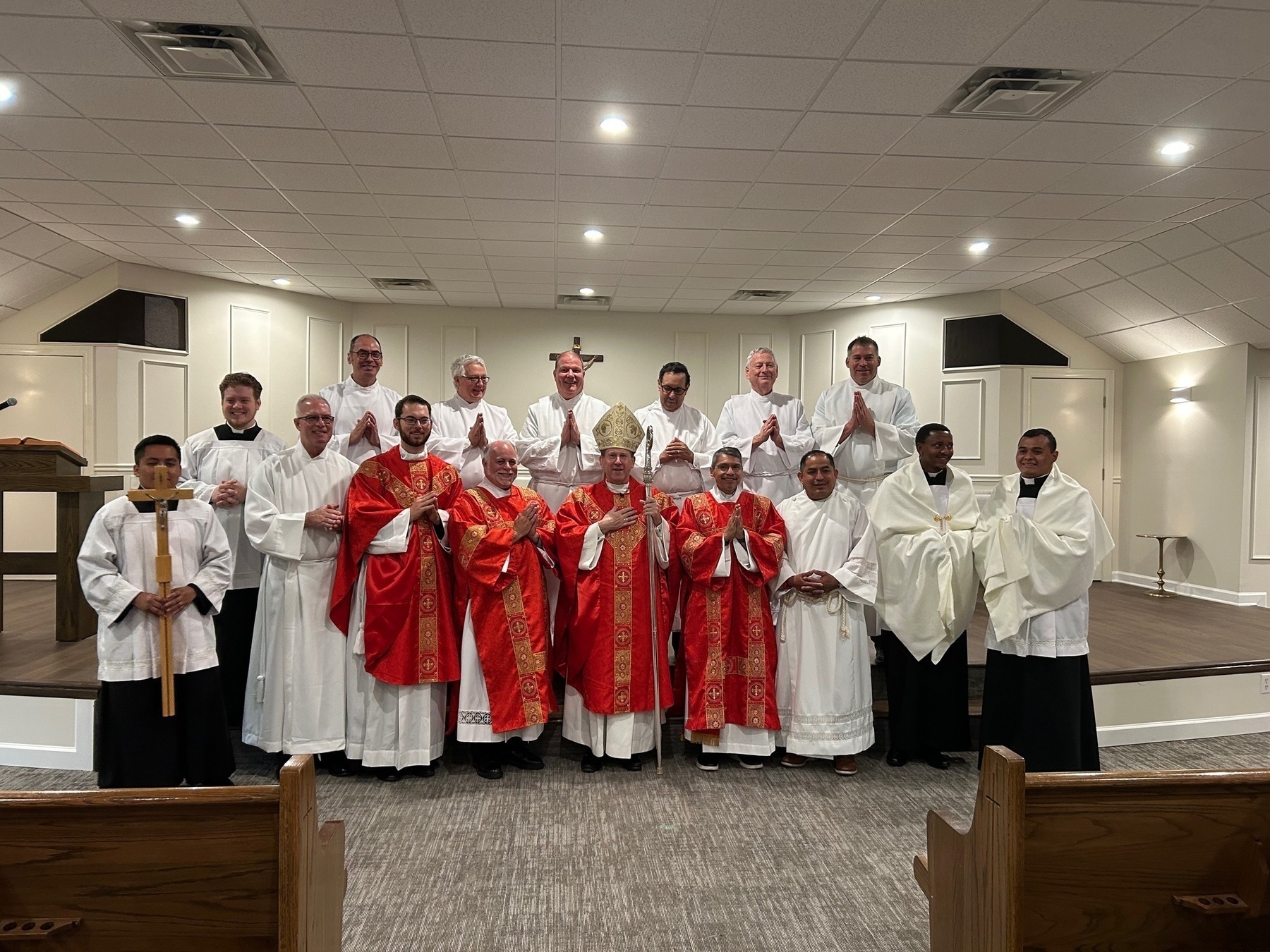Pear, elderflower, and pawpaw



Pear, elderflower, and pawpaw



Today we were instituted as acolytes! Preparation continues - this weekend’s intro to homiletics was a tee-up for a week at St. Meinrad for more intensive study in July.

I was visiting my 96-year-old grandmother in the hospital yesterday. She’s not doing well; I was able to see her receive the Anointing of the Sick and receive communion. She’s said that she’s ready to go and I’m inclined to take her at her word.
Every so often, a little tune would play over the hospital PA system. I had a hunch and asked a nurse. Turns out I was right: a little lullaby plays whenever a baby is born in the maternity ward. I think I heard that song a half-dozen times or so. On the drive back to Nashville I was on the phone updating my wife. As I told her about this I just started bawling.
Served Mass this morning with our pastor. There have been a couple of boys serving on Wednesday mornings too, but today it was just me. Prayed for the grace to be attentive and to fittingly serve and everything went perfectly. Even had to readjust the missal before holding it up - the ribbons for the Collect and whatnot were in the wrong spot. Again, smooth. The usual small group remained after for Morning Prayer and the Office of Readings. Since this Saturday we’re to be instituted as acolytes, I asked Father what, if anything, would be changing.
Oh, he got the biggest smile. Everything, he said. After Saturday you will wear an alb, not that (pointing at the cassock and surplice). You will no longer be an altar server. Then he ran through the basic duties of the acolyte - purification of vessels, simple exposition, EM - and the need for a bit of catechesis with the others on the role and responsibility. Here I had been worried that maybe Saturday was going to pass unnoticed, but apparently not. I think this last Sunday may have been my last time sitting in a pew for a while.
Aurora borealis in TN!





Hello cicada!

Dcn. Bill Ditewig writes about re-thinking the idea of “permanent” and “transitional” as they pertain to the diaconate:
First, we must immediately retire the use of adjectives to describe a deacon as either a “permanent” deacon or a “transitional” deacon. For decades now, scholars and bishops have pointed out that there is only one Order of Deacons, just as there is only one Order of Presbyters and one Order of Bishops. All ordinations are permanent, so calling a deacon a “permanent” one is redundant, and calling a seminarian-deacon a “transitional” deacon is sacramentally wrong. All deacons are permanent. We do not refer to a presbyter who is later ordained a bishop as a “transitional” priest!
I’ve thought about this a fair bit, actually, and it makes a lot of sense. Dropping the terms would be easy enough. There’s only one diaconate, so qualifying it one way or the other seems kind of dumb. Disconnection from the cursus honorum also makes a tremendous amount of sense. Seminarians aren’t discerning the diaconate; they’re discerning the priesthood. The two are formed in different ways for the two very different vocations.

Feeling a little fried. Just wrapped our class on the Eucharist, for which a paper and oral exam are still pending. Beyond that, there’s the reading and prep for an upcoming weekend on Homiletics (which is a tee-up for a week-long intensive at St. Meinrad in July). Hovering over those are the reading and planning for the closure papers in the fall, but directly in front of me are the notes for tomorrow night’s OCIA mystagogical conference on the laity. And of course, family, household stuff, day job, &c.
St. Catherine of Siena, pray for me.
I’ve been in tech for my entire life. I’m old enough to remember the Apple II rolled into the classroom on a cart for Computer Class. Professionally, I’ve been involved in it long enough to see some technologies reappear under new names, usually during sales presentations. “Workflow” showed up in the late 90s, then slipped off the radar screen long enough to become “Business Rules Engines” a decade or so later, a solution still very much in search of a problem. Most of the stuff I’ve seen has eventually failed to live up to its hype, even as the less attractive, less glamorous stuff continues to deliver day in and day out.
Even so, I’ve generally had a ball over the years, turning a hobby into an actual job that’s provided pretty well for me and my family. It would be easy to affect a sort of jaded Luddism, but frankly, there have been some things in the last year that leave me as slack-jawed as the the first day Mrs. Mingledorff. Here are five of them.
Pihole, which scrubs so much crud from the average web-browsing experience that going without it is just a hard “no.” Like a bidet, once you’ve gotten used to it, there’s simply no going back.
Alexa, Siri, LLMs, and generative AI are finally where the science fiction computers of my childhood and adolescence were supposed to be. Still waiting on the Orbital Marriott Hotel, though.
Tailscale is one of the simplest things I’ve ever set up. I’m still looking at the config, wondering if I’ve gotten something wrong somehow, but no, it was really that easy to replace my wireguard setup for VPN connectivity.
We’ve had a Chevy Bolt EUV for a couple of years, and it still sounds like the future every time I drive someplace. It’s a shame that GM is discontinuing Car Play in future models.
Wireless charging is, let’s face it, pretty cool. it looks like magic. I wish everything supported it.